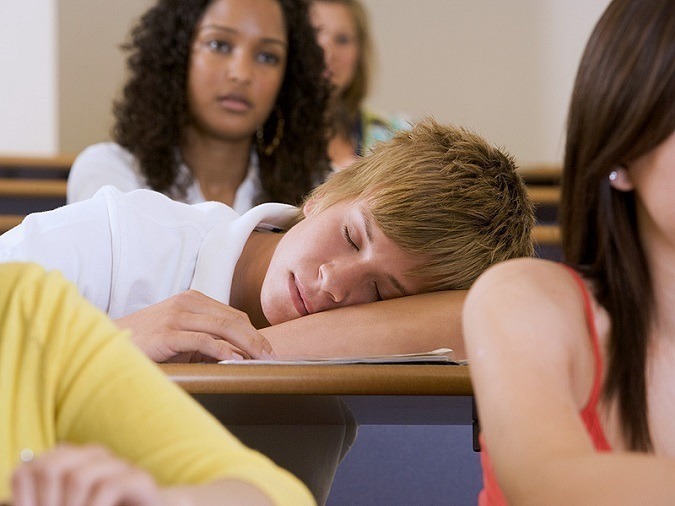Study: Don’t overlook sleep difficulties in children with ADHD; they may impair functioning as much as ADHD itself
 —–
—–
Problems with sleep are common in children with ADHD; in fact, past studies indicate that sleep problems occur in between 70 and 85%. Because of this, the American Academy of Pediatrics recommends that sleep difficulties should be assessed as part of a comprehensive ADHD evaluation. In some children, significant sleep difficulties may be an important contributor to apparent ADHD symptoms, and could contribute to a child being incorrectly diagnosed. For example, consistent insufficient sleep would certainly contribute to trouble with attention and focus. For other children, sleep problems may co-exist with ADHD and contribute to significant functional impairment on their own.
Although the link between ADHD and sleep difficulties is well-documented, evaluating sleep difficulties during an ADHD assessment may be routinely overlooked. In addition, the clinical importance of this association is not fully clear because prior research has not examined whether sleep problems in youth with ADHD contribute to impairment in their daily functioning above and beyond their ADHD symptoms. For example, a child’s problems in daily functioning may be primarily driven by ADHD their symptoms, with sleep problems contributing little. Alternatively, sleep problems may create significant difficulties for their daily functioning beyond what ADHD symptoms explain; in this case, treating the child’s sleep difficulties should be an important treatment target.
The Study
A study recently published online in the Journal of Attention Disorders, The functional impact of sleep disorders in children with ADHD, took a close look at this important issue. Participants were 192 children — mean age of about 10 — who had been carefully diagnosed with ADHD; over three-fourths were male.
Measures
Sleep — Parents rated children’s sleep using the Pediatric Sleep Questionnaire, which inquires about a broad range of sleep-related behaviors. Ratings were used to identify youth who struggled with excessive daytime sleepiness (EDS), sleep-related breathing disorder (SRBD), insomnia, and periodic limb movements (PLMS).
ADHD symptoms — Core ADHD symptoms were rated using a standardized behavior rating scale called the SNAP. Using this measure, parents and teachers rated children on each of 18 ADHD symptoms.
Functioning — Children’s daily functioning was assessed using the 50-item Weiss Functional Impairment Scale; this scale assesses functioning in multiple domains: family, learning and school, life skills, self-concept, social activities, and risky activities. Parents also complete a Health-related quality of life measure on their child.
Results
1. What is the nature of sleep problems in youth with ADHD?
The most prevalent sleep problem — reported for 42% of the sample — was excessive daytime sleepiness. This was followed by insomnia (30%), PLMS (26%), and SRBD (25%). In addition, 18% of parents reported substantial variability in their child’s sleep from night to night. A number of children had multiple sleep difficulties but this number was not provided.
2. Do sleep problems impair children’s daily functioning above and beyond ADHD symptoms?
This question was the crux of the study. Analyses indicated that sleep problems — specifically, excessive daytime sleepiness — contributed to significantly lower life skills even after controlling for ADHD symptoms. For social impairment, higher levels of insomnia predicted greater impairment, above and beyond impairment explained by ADHD symptoms. When examining parent reports of their child’s quality of life, excessive day time sleepiness predicted lower ratings.
It is important to note that because all children had ADHD, the variability in functional impairment ratings was likely compressed relative to what would be found in a non-clinical sample. This makes finding significant associations between sleep difficulties and functional impairment more difficult. This may explain, for example, why a significant relationship between sleep difficulties and school functioning was not found.
Summary and implications
Results from this study reaffirm that children with ADHD often struggle with sleep problems. And, it extends on prior research by documenting that sleep difficulties — especially excessive daytime sleepiness — make significant independent contributions to problems in children’s daily functioning and in their overall quality of life. For the quality of life measure, in fact, sleep difficulties appeared to be a more important determinant than ADHD symptoms.
While these results should be replicated, an important take away message is that the assessment and management of sleep difficulties in youth with ADHD is essential. Failing to identify and address such difficulties may undermine a child’s daily functioning, even when ADHD symptoms are being effectively addressed.
A broader issue highlighted by these findings is the importance of working to identify all factors contributing to difficulties experienced by a child with ADHD. Although ADHD symptoms can impair a child’s functioning in multiple ways, parents, educators, and clinicians need to be vigilant about not attributing all a child’s difficulties to ADHD. Doing so can short-circuit the important examination of other possible contributors which will therefore go unaddressed to the likely detriment of the child.
 – Dr. David Rabiner is a child clinical psychologist and Director of Undergraduate Studies in the Department of Psychology and Neuroscience at Duke University. He publishes the Attention Research Update, an online newsletter that helps parents, professionals, and educators keep up with the latest research on ADHD, and helped prepare the online course How to Navigate Conventional and Complementary ADHD Treatments for Healthy Brain Development.
– Dr. David Rabiner is a child clinical psychologist and Director of Undergraduate Studies in the Department of Psychology and Neuroscience at Duke University. He publishes the Attention Research Update, an online newsletter that helps parents, professionals, and educators keep up with the latest research on ADHD, and helped prepare the online course How to Navigate Conventional and Complementary ADHD Treatments for Healthy Brain Development.
To learn more:


